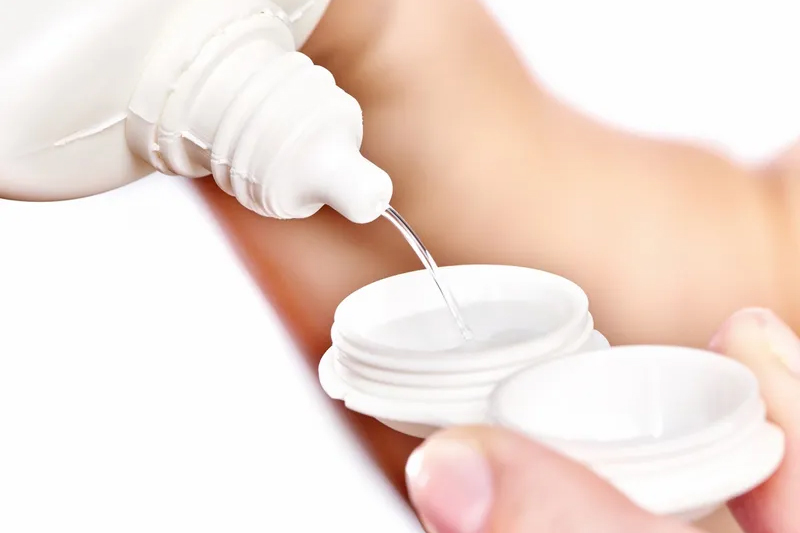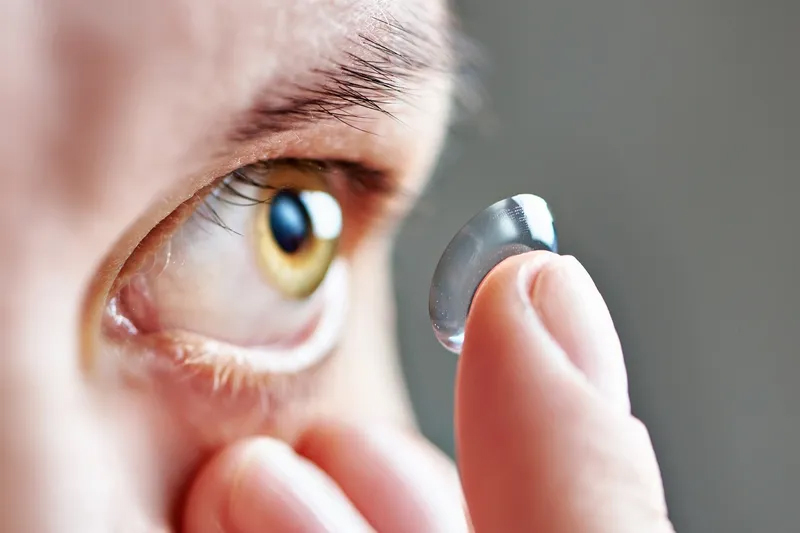
What is the best contact lens care system?
- Contact lens care systems are highly important to the success of your contact lens wear and also the reduction of risk for infections. Your contact lens care system has been carefully selected for you by your optometrist in order to be compatible with the lens and lens materials you are using as well as the way you wear your lenses.
- There are many different types of contact lens care systems but the basic two types are multipurpose care solutions and hydrogen peroxide care solutions.
- For gas permeable (GP) lenses, your solutions may contain either a one-step (multipurpose) solution or a two-step (cleaning and soaking) solution or you may also use a hydrogen peroxide solution.
Do I need to rub my lenses when I take them out?
Are my solutions good for an indefinite period of time (i.e., past the expiration date)?
Can I use any lubricants or red eye drops with my contact lenses?
- Any eye drops not approved for contact lens wear can cause damage to both the contact lens and the eye.1 Stay away from drops that claim to “get the red out,” as they typically contain chemicals that may be detrimental to your long-term eye health.
- Preservative free eye drops, in general, are very safe to use with contact lenses. Eye drops that contain preservatives can have a toxic effect on the eye and should be avoided.
I only wear my lenses occasionally. How should I store them in the meantime?
I dropped the contact lens on the floor, but I don’t have time to run an entire disinfection cycle with my solution. What do I do?
- It is not enough simply to rinse off the contaminants and dust particles from the floor. Bathroom floors and other such surfaces may harbor significantly high numbers of microorganisms.
- While the tear film and corneal surface provide a remarkable barrier to infection, one never knows when the barrier may break down.
- The only sure way to guarantee safety is to apply a new contact lens. This can be easily accomplished if you are wearing disposable soft contact lenses.
- The next best thing is to wear your back-up glasses while you clean the lens through the entire disinfection cycle as recommended by your care system’s manufacturer. Every contact lens wearer should have a pair of glasses to wear as needed in cases like these when their lenses cannot be worn.
Is it okay to use tap water to insert or store my lenses?
- No. Tap water contains micro-organisms which can lead to serious eye infections and loss of vision.1,2 One of the more well-known water-borne infections is caused by Acanthamoeba, a microscopic, free-living amoeba (single-celled organism)
- Acanthamoeba can cause an infection of the cornea, the transparent outer covering of the eye where a contact lens sits. These organisms are very common in nature and can be found in bodies of water (for example, lakes and oceans), hence the recommendation to avoid use of water with lenses.You should never use tap water in any area of your lens care, including rinsing the lenses and the lens case.
- Do not attempt to make your own homemade saline or contact lens solutions. Also, make sure your hands are completely dry before handling your lenses.
RIGID GAS PERMEABLE (GP) LENSES
Boston ADVANCE Advanced Comfort Formula System is the #1 doctor recommended two-bottle lens care system for GP (gas permeable) lenses. Boston ADVANCE Conditioning Solution and Boston ADVANCE Cleaner two-step system is easy to use and provide lens wearing comfort.
Step 1 - Boston ADVANCE Cleaner
Boston ADVANCE Cleaner removes debris and deposits from your GP lenses, leaving your lenses clean, clear, and ready for Step 2 – disinfection and conditioning. Boston ADVANCE Cleaner is visibly tinted for faster rising. The RED TIP on the cleaner bottle indicates that the cleaner is not to be put in the eye.
Step 2 - Boston ADVANCE Conditioning Solution
Boston ADVANCE Conditioning Solution dual disinfecting system delivers excellent protection against harmful microorganisms. Includes a patented cushioning system to soothe your eyes and provide lens wearing comfort.
Opening Hours
| Monday – Thursday | 8:30 – 5:00 |
| Friday | 8:30 - 4:00 |
| Saturday-Sunday | Closed |
| Open During Lunch |




